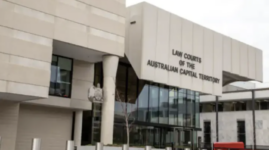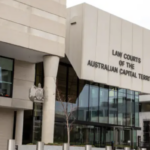Prosecution of Bruce Lehrmann: Police Join DPP in an Attempt to Clear Their Names

This time last year, then ACT top prosecutor, Shane Drumgold, and the Australian Federal Police (AFP) were engaged in a bitter feud – a slanging match criticising each other’s handling investigation and prosecution of Bruce Lehrmann over sexual assault allegations made by Brittany Higgins.
Now, they’re joining forces to launch civil proceedings in the Supreme Court over the outcome of the special inquiry into the prosecution of Bruce Lehrmann.
Let’s take a step back.
Bruce Lehrmann was charged with sexual assault over allegations made by Ms Higgins regarding an incident when the pair worked together in Parliament House in 2019.
Despite several setbacks, and a lot of media attention (bordering on interference) the case finally went to trial at the end of 2022, but was aborted in November because of juror misconduct.
A month later, then ACT Director of Public Prosecutions, Shane Drumgold, announced that a further trial would not be pursued against Mr Lehrmann, citing the complainant’s mental health as the reason for his decision.
DPP points the finger
Around the same time, Mr Drumgold made serious allegations about the way Australian Federal Police handled the criminal investigation, including engaging in “unsophisticated corruption” in an attempt to derail the prosecution.
He asked the ACT government to initiate an inquiry.
Walter Sofronoff, KC, led this inquiry and delivered his final report in August this year. At the time, Mr Drumgold was livid that he was not afforded the opportunity to read the report before it hit the media headlines.
The report had been embargoed, but it appears that mainstream media outlets ignored those instructions and Mr Drumgold had to read comments made by Walter Sofronoff via the newspapers.
DPP engaged in serious misconduct
In his final report, Mr Sofronoff KC concluded that Drumgold had engaged in “serious misconduct” by, amongst other things, lying to a Supreme Court judge in court and withholding crucial information from the defence.
Shane Drumgold resigned several days later, under circumstances that made it impossible for him to complete his tenure as chief prosecutor.
Despite the fact the report was meant to be independent – and Mr Drumgold therefore had no standing to obtain it and potentially suggest ‘changes’ before its release – the chief prosecutor claims he had been denied procedural fairness.
He released a statement acknowledging that he had made ‘mistakes’, but vehemently denied he had “engaged in deliberate or underhanded conduct in the trial or was dishonest.”
Drumgold launches proceedings
Mr Drumgold then launched civil proceedings seeking a declaration that he ‘was denied natural justice’, and for the findings of the report to be declared invalid because of an ‘apprehension of bias.’
The precise way in which the report came into the hands of the media has never been ascertained, but will likely come under scrutiny during the civil case.
There are, however, text communications between journalists and Mr Sofranoff, and last week at the first directions hearing for the civil case, the Supreme Court ordered the communications to be handed over to Shane Drumgold’s lawyers.
Police officers join challenge
During the same hearing, six police officers sought the court’s ‘leave’ (permission) to join the proceedings.
They claim this is necessary to clear their names, which have been sullied in the aftermath of Mr Lehmann’s prosecution.
The list of officers includes Detective Superintendent Scott Moller, Commander Michael Chew and Senior Constable Emma Frizzell — all of whom played a major role in the investigation and inquiry.
Detective Superintendent Moller is the author of what has become known as the ‘Moller Report, which has described Brittany Higgins as “evasive”, “uncooperative” and “manipulative”.
In their joint application, the officers asserted that many of the Mr Sofranoff’s findings were “about matters that are relevant to their reputations and their careers” … “some of those findings and comments express conclusions about the veracity or otherwise of serious allegations made with respect to the character and conduct of some of the applicants.“
The application also noted that many of the inquiry findings were favourable to the police investigators, and they did not want those overturned.
A decision about whether leave will be granted to join the proceedings will be handed down next month.
The legal ‘spin-offs’ just keep coming
The case is one of several off-shoots from the prosecution of Mr Lehrmann– the number of legal challenges relating to the allegations in vast and the twists and turns of the case continue.
The original inquiry into the investigation of allegations made by Higgins and the subsequent prosecution of Lehrmann was important for ensuring the integrity of the ACT’s criminal justice system, including providing an insight into the ways law enforcement agencies work – something which can pave the way to reforms designed to enhance the operation of the system as a whole.
Mr Drumgold certainly has the legal right to object to the findings. The civil proceedings will test the validity of the inquiry’s findings and whatever the outcome, will certainly add to the growing body of information that now exists about how this entire case – one of Australia’s most high profile trial ever – was handled and it may well deliver important learnings for law students in the years to come.
The civil challenge will be heard in the Supreme Court in February 2024.







